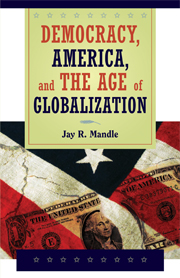Introduction
Published online by Cambridge University Press: 14 May 2010
Summary
Technological change and economic globalization are beneficial to the American economy as a whole but impose substantial costs as well. How those benefits and costs are distributed is determined by the country's political institutions. Globalization can become a source of economic renewal and advance for the people of this country. But the converse is also possible. And what is worse, at present that appears to be the more likely outcome. The inequality built into our politics makes it all too probable that technological advances and continued economic growth in today's poor countries will worsen the already too deep economic and social fissures present in American society.
The thesis presented in this book is that our political system is too biased toward the interests of wealthy campaign contributors to respond fairly to the problems that emerge from the new global economic order. My argument is that the kinds of policy interventions that could offset deepening domestic income inequality require an egalitarian politics, something that we sadly lack today. The systematically unequal political process present in the United States cannot be expected to produce a just response to the inequities associated with globalization. The late John Rawls, the eminent theorist of justice, explains why this is so:
the liberties protected by the principle of participation lose much of their value whenever those who have greater private means are permitted to use their advantages to control the course of public debate … eventually these inequalities will enable those better situated to exercise a larger influence over the development of legislation. […]
- Type
- Chapter
- Information
- Democracy, America, and the Age of Globalization , pp. 1 - 6Publisher: Cambridge University PressPrint publication year: 2007

